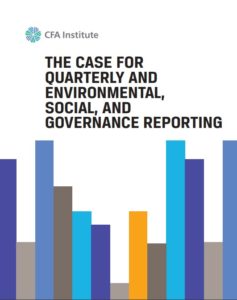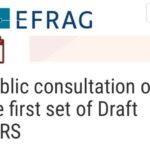
In August 2019, the CFA Institute, a global association of investment professionals, published a report entitled “The Case for Quarterly and Environmental, Social, and Governance Reporting” that is based on a survey of its global membership on the topic. Respondents to the survey believe that specific ESG and sustainability disclosures should be a regulatory requirement for public companies and that securities regulators should either develop ESG disclosure standards or support an independent standards setter (i.e., a single, global standards setter in this field) to develop such standards.
Methodology
A total of 768 individuals completed the survey; and yielded a useable response rate of 3 percent. A sample of this size has a margin of error of plus or minus 3.5 percent at a 95 percent confidence level. This means that if the survey was repeated 100 times with different samples from the same population, 95 out of 100 samples would yield a result within plus or minus 3.5 percent of each statistic reported in this study. For example, if an answer is offered by 50 percent of respondents, the results would range between a high of 53 percent and a low of 47 percent for 95 out of 100 other samples from the same population.
Key Findings
- Investors strongly support quarterly reporting.
- Half the respondents say quarterly reports are more important than earnings releases.
- There is no support for alternative reporting models or reduced reporting frequency.
- More than half the respondents support for specific environmental, society, and governance (ESG) reporting and that sustainability disclosures should be a regulatory requirement of public companies.
- A large majority believe securities regulators should either develop ESG disclosure standards or support an independent standard setter to develop such standards.
- There is a majority who support that earnings releases and quarterly reports be released simultaneously.
- The majority of respondents say earnings releases should be tagged and machine-readable.
- The majority say there is no comparison between earnings releases and quarterly reports. Earnings releases provide minimal and slanted information, while quarterly reports provide standardized and detailed financial information that is extremely valuable to investors.
- Respondents are not in favor of the SEC’s proposed “Supplemental Approach”.



